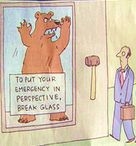wearysoul wrote:
robysue wrote:If those are the kinds of things that start going through your mind when you first become aware of the fact that you are awake, then you are likely making the wake last longer and you are making it harder to get back to sleep.
Yes, my thoughts are similar to those you described. I know the mental gymnastics (even though I feel lethargic when they occur) are making it harder to go back to sleep. When I first become aware I'm awake, I just sort of mentally groan, notice how tired I feel, and hate the options: tossing and turning in bed or getting up. I don't try to figure out why I'm awake, but I feel upset because I know that nearly always it means I'll be awake for a while.
As soon as you start the "mental groaning" and "hating the options" and allow yourself to "feel upset", you are making the wake last longer and making yourself feel worse.
In other words:
Expecting to have trouble getting back to sleep and being upset about being awake may cause you to stay wake longer and have more trouble getting back to sleep.
So you need some behavior strategies to short-circuit the "getting upset because you know that nearly always it (noticing the wake) means you'll be awake for a while." So you now have something specific to ask the CBT-I person: Ask for specific tips on how to keep your mind from starting down this path.
robysue wrote:Turn the clock around so you can't see it when you first wake up. And try not to obsess about finding out the time when you do wake up at night.
I don't immediately look at the clock when I wake up, but when I get up, I do check the time. I have a cheap battery-powered clock that cannot be seen easily in the dark. I have to use a little flashlight. In a way, keeping the sleep log now seems to make it necessary to check the time. But I was doing it before CBT-I too.
Talk the CBT-I person. The sleep log should NOT require you to look at a clock from the time you record "time I went to bed" to "time I got up for the moring." Between those two times, you really ought to NOT look at a clock at all. All times should be estimated---the reason is that much of insomnia is in the perception of the insomniac: Most insomniacs get more sleep than they think they do---if they're not busy all night long documenting how much (or how little) sleep they got.
If you really think that you need to know the time each wake occurs, use the PAP to document the wakes by turning your machine OFF and then back ON. Is it a bit inconvenient? Yes, but it's no more inconvenient than your flashlight needed to look at the clock is. And, in the long run, turning the PAP OFF and ON will be less disruptive since it won't cause you to focus on the time.
You'll know your insomina is getting better, by the way, when you start to notice OFF/ON cycles in your PAP data that you have no memory of----those are short (normal) wakes where you got back to sleep without thinking about being awake in the middle of the night.
robysue wrote:
When you first become aware of the fact that you are awake, pay attention to your physical comfort rather than wondering or worrying about your (lack) of sleep. ...
Great ideas . . . especially about paying attention to physical comfort. Also, one thing I've tried a few times recently is to pay attention to my breathing. I count four breaths over and over. Sometimes doing that helps to distract me.[/quote]Ever do any mindfulness exercises or meditation? Those can also help some people.
Another idea: Get yourself a pair of cheap external speakers for the iPod and make it possible for you to turn the iPod to your "sleepy music" when you are still in bed. When you wake up, turn the iPod on and see if that helps your mind stay at ease instead of starting to focus on all the negative things about "being awake".
robysue wrote:Are the following estimates instead of based on what the clock says:
minutes it took to fall asleep
number of minutes of each awakening
time of final awakening (I could see if this one is "clock", more on that in a bit)
Yes, they're estimates, except for the awakenings that cause me to get up for a period of time. Then I look at the clock.
You have to break the "look at the clock habit." And that's even important for the wakes that make you get out of bed for a time. You are better off NOT looking at the clock at all for the entire time you're out of bed.
Look at it this way: Right now, you wake up, can't get back to sleep and you KNOW that it's 5:30 and you EXPECT that you won't get back to sleep until it's 6:30 and you KNOW that wake up time is 7:00. So of course you worry and get distressed.
If you didn't look at the clock, you could
hope that the wake isn't so close to wake up time and you could focus on what it takes to get sleepy without fretting that you'll have at most 30 minutes of sleep time when you go back to bed. You might just get sleepier FASTER if you didn't know what time it was.
So use the CPAP to document the long wakes rather than mentally taking note by looking at the clock. You'll be able to tell exactly when you got up and how log you were out of bed by looking at the CPAP data.










